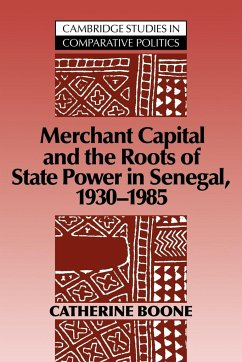A study of the ways in which the exercise of state power in Africa has inhibited economic growth, focusing on Senegal.
In most post-colonial regimes in sub-Saharan Africa, state power has been used to structure economic production in ways that have tended to produce economic stagnation rather than growth. Catherine Boone examines the ways in which the exercise of state power has inhibited economic growth, focusing on the case of Senegal. She traces changes in the political economy of Senegal from the heyday of colonial merchant capital in the 1930s to the decay of the 1980s and reveals that old trading monopolies and commercial hierarchies were preserved at the cost of reforms that would have stimulated economic growth. Boone uses this case to develop an argument against analyses of political-economic development that identify state institutions and ideologies as independent forces driving the process of economic transformation. State power, she argues, is rooted in the material and social bases of ruling alliances.
Review quote:
"...an economic story about politics and a political story about colonial and neocolonial economies...this book could take its place alongside the classic economic history of the rise of capitalism in Europe, and in Britain in particular."
ASA News
"Boone has produced a splendid book. In its theoretical intelligence and empirical richness, it is one of the most important recent works on African political economy."
Comparative Politics
"...a balanced judgement and humane. This is an impressive contribution to the literature on the wobbly underpinnings of the African state."
Journal of African Studies
"With a comprehensive discussion ranging from the financing and marketing of textiles to grand sociological theory, the book is an impressive achievemnt, deserving a place in respectable Africa collections...."
H. Glickman, Choice
"...this book represents a real step towards the understanding of Africa's current state, and why it remains elusive to neoclassical economists and developmentalists."
Mohamed Mbodi, International Journal of African Historical Studies
"Boone's elegant study is highly focused and detailed....add[s] important new dimensions to the ongoing debate."
Patrick O'Meara, Journal of Politics
"...instructive for anyone concerned with the politics of economic reform, not only in Africa but in postcommunist Eastern Europe as well."
Ronald Kassimir, Contemporary Sociology
Table of contents:
List of tables and figures; Preface and acknowledgements; Introduction; 1. Capital and contingencies of post-colonial politics; 2. The colonial market; 3. Consolidation of a regime: neo-colonialism in the 1960s; 4. Growth of Senegal's textile industry, 1960-1975; 5. Reappropriation of the state: the 1970s; 6. Demise of the Dakar textile industry; 7 Conclusion: states, capital and capitalist states; Appendix: exchange rates; References; Index.
In most post-colonial regimes in sub-Saharan Africa, state power has been used to structure economic production in ways that have tended to produce economic stagnation rather than growth. Catherine Boone examines the ways in which the exercise of state power has inhibited economic growth, focusing on the case of Senegal. She traces changes in the political economy of Senegal from the heyday of colonial merchant capital in the 1930s to the decay of the 1980s and reveals that old trading monopolies and commercial hierarchies were preserved at the cost of reforms that would have stimulated economic growth. Boone uses this case to develop an argument against analyses of political-economic development that identify state institutions and ideologies as independent forces driving the process of economic transformation. State power, she argues, is rooted in the material and social bases of ruling alliances.
Review quote:
"...an economic story about politics and a political story about colonial and neocolonial economies...this book could take its place alongside the classic economic history of the rise of capitalism in Europe, and in Britain in particular."
ASA News
"Boone has produced a splendid book. In its theoretical intelligence and empirical richness, it is one of the most important recent works on African political economy."
Comparative Politics
"...a balanced judgement and humane. This is an impressive contribution to the literature on the wobbly underpinnings of the African state."
Journal of African Studies
"With a comprehensive discussion ranging from the financing and marketing of textiles to grand sociological theory, the book is an impressive achievemnt, deserving a place in respectable Africa collections...."
H. Glickman, Choice
"...this book represents a real step towards the understanding of Africa's current state, and why it remains elusive to neoclassical economists and developmentalists."
Mohamed Mbodi, International Journal of African Historical Studies
"Boone's elegant study is highly focused and detailed....add[s] important new dimensions to the ongoing debate."
Patrick O'Meara, Journal of Politics
"...instructive for anyone concerned with the politics of economic reform, not only in Africa but in postcommunist Eastern Europe as well."
Ronald Kassimir, Contemporary Sociology
Table of contents:
List of tables and figures; Preface and acknowledgements; Introduction; 1. Capital and contingencies of post-colonial politics; 2. The colonial market; 3. Consolidation of a regime: neo-colonialism in the 1960s; 4. Growth of Senegal's textile industry, 1960-1975; 5. Reappropriation of the state: the 1970s; 6. Demise of the Dakar textile industry; 7 Conclusion: states, capital and capitalist states; Appendix: exchange rates; References; Index.



![To the Right Honourable the Lords Commissioners of the Admiralty [microform]: the Humble Memorial of Thomas Bridge of Bread-Street, London, Merchant To the Right Honourable the Lords Commissioners of the Admiralty [microform]: the Humble Memorial of Thomas Bridge of Bread-Street, London, Merchant](https://bilder.buecher.de/produkte/65/65516/65516267m.jpg)




